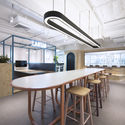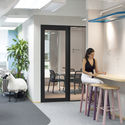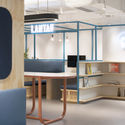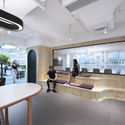

“The narrative is inspired by the layered densities of downtown Wanchai in Hong Kong in terms of the neon signs on porous facades, as a set of architectural joinery devices to encourage social interaction and chance encounter in this workplace." - Kenny Kinugasa-Tsui, co-founder of Bean Buro

“We developed a dynamic palette composed of natural finishes with coloured accents. The main feature was a bar island upon entry surrounded by diner style booths, and a sculptural boardroom that visually frames the external street view constructed entirely in plywood.” - Lorène Faure, co-founder of Bean Buro

Placed at the heart of the dynamic Wanchai district is Bean Buro’s design for marketing brand Williams Lea Tag’s new workplace in Hong Kong. Drawing reference from the district's urban typologies and symbol, the proposal reinterprets characteristic framing and layering devices, generating a work environment that feels as raw, diverse, and multifaceted as its context.

The design brief was to create a new workplace for the international creative company to house their 80 people workforce in Hong Kong which includes fixed and flexible desks, as well as a variety of collaboration spaces.

This 7,200sqft (670sqm) workplace reinforces the Williams Lea Tag’s pursuit in fostering a spirited, sociable and collaborative work environment in a way that echoes the unique spatial experience of the adjacent Lockhart Road, where networks of neon signs, Scaffolds and shopfronts superimpose public and private realms.

Upon entry into the front of house, visitors are greeted by a series of rhythmic framing, screening and layering devices that guide the eye through the space and out into the city, stretching and distorting the boundary between interior and exterior. Two generous collaboration booths and informal seating moments are framed with blue scaffold, a language applied throughout the space to denote and invigorate flexible working spaces, offering momentum and directionality. Bespoke neon Signage seems to have been taken directly from the streets below, whilst an informal bookshelf / display area appears as a magazine stand on a street corner.

Striking plywood framing details envelop the main architectural elements across the floor plate, emboldening shadows, generating rhythm and seemingly revealing their raw structure as a subtle industrial gesture.

The main architectural player in the space, a sculptural plywood boardroom that functions at once as informal seating, formal meeting space, storage and viewfinder. Acting as a backdrop for nearly all front and back of house spaces, the boardroom employs a vibrant hue and grain, bringing warmth to more neutral office zones. Within the volume, a peaceful, light-filled boardroom atmosphere with excellent views both into and out of the space, completed with a large feature pendant. An emblematic black, arched portal door framed in blue acts as the threshold into the space, perpetuating a sense of understated playfulness.

A bespoke, rounded pantry table and complimentary pendant light piece imbue the pantry space with additional vitality - moments of bold contrast and colour. Seating up to 16 people, the table becomes an opportunity for respite, rest and conversation amongst an otherwise busy front of house. A Raw pantry conceals plentiful storage for the office of 80 employees, as well as another arched door with playful porthole detail.

In the main open plan spaces, variation and energy is explored through distinct carpet and wall treatments that generate spatial hierarchy effectively with simple colours and tones. Broad, sweeping fillets cut across the floor, denoting space allocated to key departments, whilst corresponding paint curves on vertical surfaces begin to suggest a division in the 3rd dimension. The overall effect is a multilayered open plan that feels spatial and architectural.

Placed at the centre of the open plan in a supporting roles are a collaborative Island, 2 acoustically sealed phone booths concealed by a writeable exterior surface, an informal collaboration worktop with a vibrant scaffold detail.

Meeting rooms with large glass partitions framed in black retain as much natural light as possible. Simple variations of back painted writable glass, coloured wall and feature display ledges give each room a sense of personality, orienting individuals in the space.










































